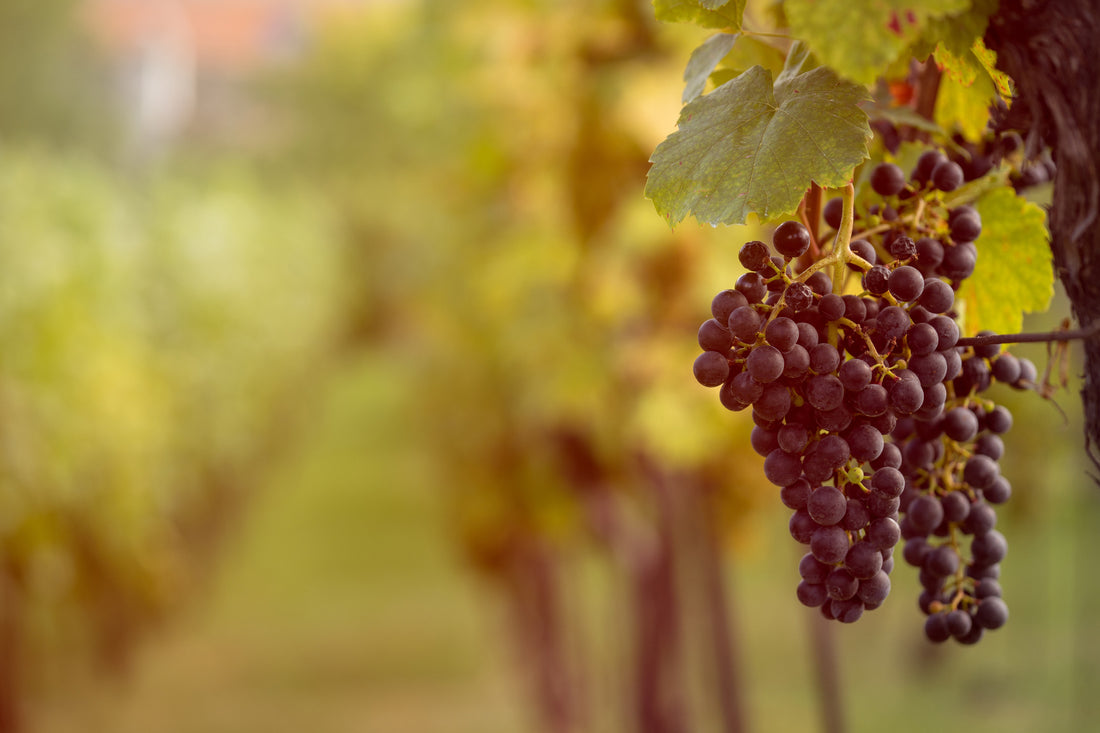Dry Farm Wines vs. Commercial Wines
Our natural wines are unlike anything you’ve had before. Each bottle is an exquisite expression of artisan winemaking, shaped by nature’s unpredictability.
We take pleasure in sourcing wines that express nature joyfully. Here are 7 things that set us apart from commercial wine producers.
1) No toxic additives
In the United States, wine producers can use 76 different additives in wine, without disclosing any of them on the bottle.
Commercial wine producers use additives for consistency - they’re making millions of bottles, and they want them all to look and taste the same. That means adding defoaming agents, artificial coloring (virtually every red wine under $20 has the colorant “mega purple”), extra sugar, high fructose corn syrup, ammonia (part of the reason low-quality wine makes you nauseous the next morning), and genetically modified bacteria and yeasts.
All these additives offer companies such tight control over their wine that nature’s seasons no longer matter. Every wine will taste the same, year after year and bottle after bottle.
We value wine guided by the diversity of nature, without interference from commercial additives.
2) No sugar or carbs
Most commercial wines are bottled before they fully ferment to speed up production and maximize profits.
Our wines ferment at their natural pace, which allows yeasts and bacteria to convert the natural sugar into alcohol, and the alcohol into other compounds. We lab-test our wines to make sure they have statistically insignificant amounts of sugar and carbs (<1g/L for each).
Why so low? The main reason is health. We celebrate the ability to pair wine with a Paleo or Keto low-carb lifestyle.
3) Lower alcohol
Commercial winemaking favors higher-alcohol wines. Average alcohol content in wine has been rising over the past couple decades, currently sitting around 14% ABV. Our wines are, at most, 12.5% ABV, and many are lower. We choose low-alcohol wines for a few reasons:
- Alcohol drowns out the finer notes in wine. Studies find casual drinkers enjoy low-alcohol wine more. We notice the same, and think you will too.
- A glass or two of wine a day improves heart health and enhances your insulin response. It may also help you live longer: in nearly all Blue Zones - parts of the world where people live longest - moderate alcohol consumption is part of the culture. But any more than a drink or two and alcohol becomes a toxin. We want you to be able to enjoy a couple glasses of wine with dinner while staying comfortably within the beneficial dose for alcohol.
4) Living wines
Look at these two images of wines under a microscope:

The top one is a commercial Sancerre wine that’s been sterilized and clarified. The bottom is also a Sancerre that’s been grown naturally and bottled without filtering.
The commercial Sancerre is dead in the bottle. All the living organisms in it have been killed and removed.
The natural Sancerre is alive. It’s rich with beneficial bacteria and wild native yeasts that continue to influence the wine, even as it sits in the bottle. The result is complexity of aroma and flavor that evolves over time. Leave the bottle out for a couple hours and you’ll return to a whole new tasting experience. The yeasts and bacteria offer health benefits, too.
By the way, the photo above is borrowed from Isabelle Legeron’s book, Natural Wines. It’s a masterful exploration of biodynamic wine, and the best place to start if you’re interested in discovering the rich culture that surrounds artisanal winemaking. You can order a copy here.
5) Small, biodynamic farms
Organic/biodynamic farms are wild ecosystems. The farmers who make our wines balance grapevines with trees, flowers, herbs, vegetables, chickens, sheep, and so on. Each farm is a contained natural world, home to a rich variety of parts that coexist in harmony. The biodiversity strengthens soil bacteria, leading to healthier, polyphenol-rich wines with thoughtful complexity of flavor.
Our wines also all come from organically-farmed vines that are dry farmed. That means no pesticides and no irrigation. Organic dry farming creates resilient grapes with a wide array of aromatic compounds, imparting a beautiful personality to our wines.

The biodynamic Manincor Estate in Alto Adige, Italy. Photo credit here.
6) Sustainability
All our wines come from sustainable winemakers whose practices return nutrients and bacteria to the soil. Our wines reflect nature’s logic and design; they enrich the natural world instead of destroying it. Sustainable winemaking means lower yields and a longer growing and aging process; the exquisite end result is worth the patience.
7) Taste
Ultimately, our obsession with quality comes down to taste. We source soulful wines that capture the elegance of nature. Each bottle contains a living, evolving experience.
Natural wine crafted according to our health criteria also tastes clean and fresh. Without heavy additives and artificial flavoring, the wine goes down smoothly. It pairs better with food, and it’s wonderfully drinkable.
Wine is an expression of decadence. At the end of the day, it’s meant to be enjoyed and to bring people together in love. We take great pleasure in tasting our wines; we hope you will too.

